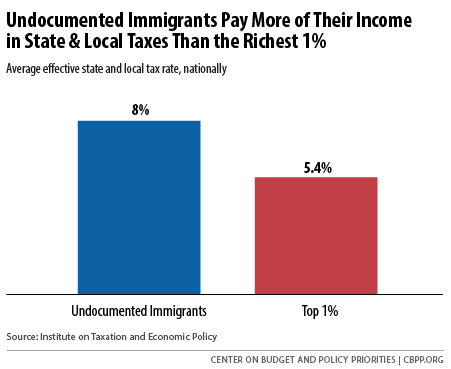off the charts
POLICY INSIGHT
BEYOND THE NUMBERS
BEYOND THE NUMBERS
Undocumented Immigrants Pay Larger Share of Income in State and Local Taxes Than Top Earners
| By
Michael Leachman
Undocumented immigrants pay a larger share of their income in state and local taxes than the nation’s top earners and immigration reform would improve state and local finances across the country, a new report from the Institute on Taxation and Economic Policy (ITEP) shows.
Undocumented immigrants pay sales taxes when they buy goods and services; property taxes (mostly through their rent); and income taxes through their paychecks — even those who don’t file income tax returns, although as many as three-quarters do.
Among the report’s key findings:
- Undocumented immigrants paid about $11.8 billion in state and local taxes in 2012.
- They pay about 8 percent of their income, on average, to state and local taxes, significantly higher than the 5.4 percent that the average taxpayer in the top 1 percent pays. (See chart.)
- President Obama’s executive actions providing a temporary reprieve from deportation and a three-year, renewable work permit to some undocumented immigrants will boost state and local tax revenues by as much as $845 million a year when fully implemented, and it will raise the effective state and local tax rate that undocumented immigrants pay to 8.7 percent from 8 percent. That’s mainly because the temporary reprieve and work permits both raise these immigrants’ wages, on average, and increase the share who file income taxes.
- Comprehensive immigration reform would further boost the state and local taxes that these immigrants pay, for similar reasons. ITEP estimates that granting lawful permanent residence to all undocumented immigrants now in the country would lift state and local tax collections by about $2.2 billion a year.
Topics:
Stay up to date
Receive the latest news and reports from the Center

